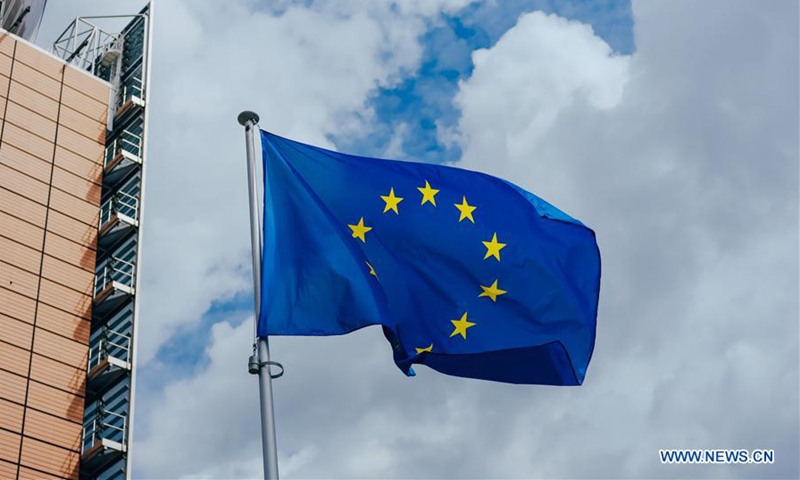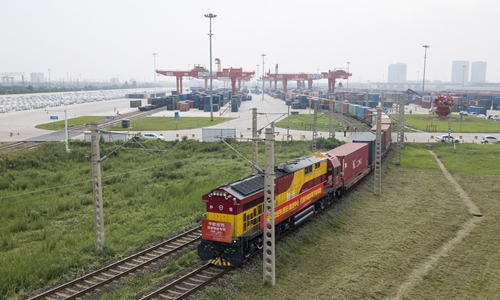
A European Union flag is seen in front of the European Commission headquarters in Brussels, Belgium, July 7, 2020. Photo: Xinhua
The European Union (EU) needs to seize the window of opportunity and push for signing the China-EU bilateral investment treaty (BIT) by the end of the year, to achieve a win-win pact for businesses on both sides against the backdrop of the pandemic and unilateralism, experts said.
The remarks came after Pictet Asset Management, Europe's leading independent private wealth and asset manager, subordinated to Geneva-based Pictet Group, announced on Monday the establishment of a wholly foreign-owned company in Shanghai. The company will focus on cross-border investment.
Pictet Asset Management will be able to raise funds from qualified Chinese investors to invest overseas through the Qualified Domestic Limited Partners program, media reports said.
Pictet Group is not alone among leading investors from the EU.
German industrial robot maker Hahn Automation plans to invest millions of euros to build a factory in China over the next three years to capitalize on the country's faster recovery from the pandemic, Reuters reported on Wednesday.
China's continuous opening up of financial services and high-quality sectors offers new opportunities for companies from the EU, and the BIT will make it things even easier in the post-pandemic era, experts said.
On the Chinese side, it's possible that political constraints on issues like Huawei's 5G will be lifted in the EU should a BIT be reached, experts said.
As a high-standard bilateral investment treaty, the BIT will make it easier for bilateral enterprises to invest, lead to more transparent economic and trade activities and supervision, strengthen the protection of intellectual property rights, and make market competition fairer and more standardized, Ding Chun, director of the Center for European Studies at Fudan University, told the Global Times on Monday.
If the BIT can be signed, it will be a win-win deal for China and the EU, and also the world. Both sides should uphold multilateralism and free trade to make reasonable bargains and seize the limited time window, Ding said.
China and the EU held the 34th round of BIT negotiations last week, and they expect to make positive progress during in-depth consultations on remaining issues, Gao Feng, spokesman for the Ministry of Commerce, said last Thursday.
But hurdles remain to signing the BIT by the year's end.
"It has been around half a year since the BIT was initiated, and it is the will of both sides to be able to reach the deal soon, which has been further boosted after China's successful signing of RCEP, pushing the EU to make an agreement with China at the earliest opportunity," Wang Yiwei, director of the Institute of International Affairs at Renmin University of China, told the Global Times on Monday.
Wang said that the three main sections involved in BIT negotiations are market access, a level playing field, and sustainable growth, with the last two completed in the negotiations.
Some issues involving sustainable development, facial recognition, and human rights are still under discussion
"As a union consisting of different countries, the EU has always asked China to offer more advantages, while it has done little," said Wang.
Ye Bin, a research fellow specializing in EU laws at the Institute of European Studies at the Chinese Academy of Social Sciences, told the Global Times of another hurdle to the BIT.
The EU released a white paper on foreign subsidies in June and plans to introduce a new competition regulatory tool to vet foreign companies in Europe, which has largely changed the basis of the BIT treaty, said Ye.
The EU's mood is changing since Joe Biden won the US election, which diverted much of their attention from making an agreement with China in a timely manner, experts said.




